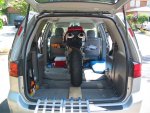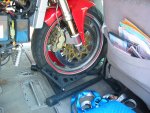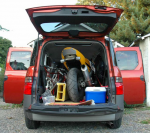Some years ago I used to tow a 300kg bike on a light homemade trailer, with a Mazda Protege 5.
First, to answer your question "am I missing anything":
1. You did not mention anything about straps to tie down the bike. It is not very straightforward process and if it's not done right there could be some consequences. If you are not familiar with the process check out some youtube videos about the topic and learn how to do it yourself. Invest in some good quality straps.
2. As was mentioned before, there are several ball standards (1" 7/8, 2", etc.), the trailer's coupler will determine what ball size is needed. Try to find out what ball size is required for your trailer. Before attaching any trailer I lube the ball with vaseline. Might be worth paying a visit to your local u-Haul dealer and see the trailer yourself, measure the coupler's height from the ground when the trailer bed is level and use that value to pick the right hitch receiver.
3. Other accessories that you'll need are hitch pin and clip to secure the hitch receiver. These won't break the bank but without them there will be no towing.
A couple of things you might want to consider:
a. The trailer is pushing down on the ball which is behind the rear axle, and the effect is to lift the weight from the front axle. On one of my trips with the Protege (FWD car), I encountered wet pavement and noticed that at 100km/h the front wheels started slipping in trying to keep up the speed. Then I realized then how light is the front axle and slowed down even more.
b. Proper tongue weight is very important and should be 10-15% of the loaded trailer weight. Too much weight on the tongue and you'll lift the front of the car, not enough weight and the trailer will be very unstable. Where you tie down the bike will determine the tongue weight. Check out this video:
First, to answer your question "am I missing anything":
1. You did not mention anything about straps to tie down the bike. It is not very straightforward process and if it's not done right there could be some consequences. If you are not familiar with the process check out some youtube videos about the topic and learn how to do it yourself. Invest in some good quality straps.
2. As was mentioned before, there are several ball standards (1" 7/8, 2", etc.), the trailer's coupler will determine what ball size is needed. Try to find out what ball size is required for your trailer. Before attaching any trailer I lube the ball with vaseline. Might be worth paying a visit to your local u-Haul dealer and see the trailer yourself, measure the coupler's height from the ground when the trailer bed is level and use that value to pick the right hitch receiver.
3. Other accessories that you'll need are hitch pin and clip to secure the hitch receiver. These won't break the bank but without them there will be no towing.
A couple of things you might want to consider:
a. The trailer is pushing down on the ball which is behind the rear axle, and the effect is to lift the weight from the front axle. On one of my trips with the Protege (FWD car), I encountered wet pavement and noticed that at 100km/h the front wheels started slipping in trying to keep up the speed. Then I realized then how light is the front axle and slowed down even more.
b. Proper tongue weight is very important and should be 10-15% of the loaded trailer weight. Too much weight on the tongue and you'll lift the front of the car, not enough weight and the trailer will be very unstable. Where you tie down the bike will determine the tongue weight. Check out this video:



























